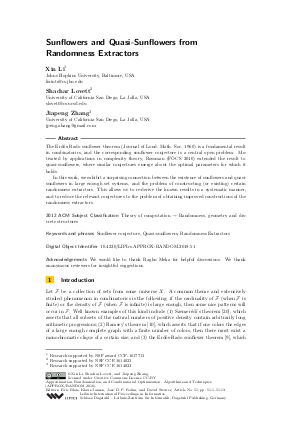Sunflowers and Quasi-Sunflowers from Randomness Extractors
Authors Xin Li, Shachar Lovett, Jiapeng Zhang
-
Part of:
Volume:
Approximation, Randomization, and Combinatorial Optimization. Algorithms and Techniques (APPROX/RANDOM 2018)
Part of: Series: Leibniz International Proceedings in Informatics (LIPIcs)
Part of: Conference: International Conference on Randomization and Computation (RANDOM)
Part of: Conference: International Conference on Approximation Algorithms for Combinatorial Optimization Problems (APPROX) - License:
 Creative Commons Attribution 3.0 Unported license
Creative Commons Attribution 3.0 Unported license
- Publication Date: 2018-08-13
File

PDF
LIPIcs.APPROX-RANDOM.2018.51.pdf
- Filesize: 472 kB
- 13 pages
Document Identifiers
Subject Classification
ACM Subject Classification
- Theory of computation → Randomness, geometry and discrete structures
Keywords
- Sunflower conjecture
- Quasi-sunflowers
- Randomness Extractors
Metrics
- Access Statistics
-
Total Accesses (updated on a weekly basis)
0PDF Downloads0Metadata Views
Abstract
The Erdös-Rado sunflower theorem (Journal of Lond. Math. Soc. 1960) is a fundamental result in combinatorics, and the corresponding sunflower conjecture is a central open problem. Motivated by applications in complexity theory, Rossman (FOCS 2010) extended the result to quasi-sunflowers, where similar conjectures emerge about the optimal parameters for which it holds. In this work, we exhibit a surprising connection between the existence of sunflowers and quasi-sunflowers in large enough set systems, and the problem of constructing (or existing) certain randomness extractors. This allows us to re-derive the known results in a systematic manner, and to reduce the relevant conjectures to the problem of obtaining improved constructions of the randomness extractors.
Cite As Get BibTex
Xin Li, Shachar Lovett, and Jiapeng Zhang. Sunflowers and Quasi-Sunflowers from Randomness Extractors. In Approximation, Randomization, and Combinatorial Optimization. Algorithms and Techniques (APPROX/RANDOM 2018). Leibniz International Proceedings in Informatics (LIPIcs), Volume 116, pp. 51:1-51:13, Schloss Dagstuhl – Leibniz-Zentrum für Informatik (2018)
https://doi.org/10.4230/LIPIcs.APPROX-RANDOM.2018.51
BibTex
@InProceedings{li_et_al:LIPIcs.APPROX-RANDOM.2018.51,
author = {Li, Xin and Lovett, Shachar and Zhang, Jiapeng},
title = {{Sunflowers and Quasi-Sunflowers from Randomness Extractors}},
booktitle = {Approximation, Randomization, and Combinatorial Optimization. Algorithms and Techniques (APPROX/RANDOM 2018)},
pages = {51:1--51:13},
series = {Leibniz International Proceedings in Informatics (LIPIcs)},
ISBN = {978-3-95977-085-9},
ISSN = {1868-8969},
year = {2018},
volume = {116},
editor = {Blais, Eric and Jansen, Klaus and D. P. Rolim, Jos\'{e} and Steurer, David},
publisher = {Schloss Dagstuhl -- Leibniz-Zentrum f{\"u}r Informatik},
address = {Dagstuhl, Germany},
URL = {https://drops.dagstuhl.de/entities/document/10.4230/LIPIcs.APPROX-RANDOM.2018.51},
URN = {urn:nbn:de:0030-drops-94555},
doi = {10.4230/LIPIcs.APPROX-RANDOM.2018.51},
annote = {Keywords: Sunflower conjecture, Quasi-sunflowers, Randomness Extractors}
}
Author Details
Funding
- Li, Xin: Research supported by NSF award CCF-1617713
- Lovett, Shachar: Research supported by NSF CCF-1614023
- Zhang, Jiapeng: Research supported by NSF CCF-1614023
References
-
Noga Alon, Amir Shpilka, and Christopher Umans. On sunflowers and matrix multiplication. Computational Complexity, pages 214-223, 2012.

-
Boaz Barak, Guy Kindler, Ronen Shaltiel, Benny Sudakov, and Avi Wigderson. Simulating independence: New constructions of condensers, ramsey graphs, dispersers, and extractors. In Proceedings of the thirty-seventh annual ACM symposium on Theory of computing, pages 1-10. ACM, 2005.

-
Avraham Ben-Aroya, Dean Doron, and Amnon Ta-Shma. Explicit two-source extractors for near-logarithmic min-entropy. In Proceedings of the 49th Annual ACM Symposium on Theory of Computing, 2017.

-
Eshan Chattopadhyay and David Zuckerman. Explicit two-source extractors and resilient functions. In Proceedings of the 48th Annual ACM Symposium on Theory of Computing, 2016.

-
Benny Chor and Oded Goldreich. Unbiased bits from sources of weak randomness and probabilistic communication complexity. SIAM Journal on Computing, 17(2):230-261, 1988.

-
Gil Cohen. Two-source extractors for quasi-logarithmic min-entropy and improved privacy amplification protocols. In Proceedings of the 49th Annual ACM Symposium on Theory of Computing, 2017.

-
Ernie Croot, Vsevolod F. Lev, and Péter Pál Pach. Progression-free sets in z₄ⁿ are exponentially small. Annals of Mathematics, 185(1):331-337, 2017.

-
Paul Erdős. Some remarks on the theory of graphs. Bull. Amer. Math. Soc., 53(4):292-294, 1947.

-
Paul Erdős and R Rado. Intersection theorems for systems of sets. Journal of the London Mathematical Society, 35(1):85-90, 1960.

-
Paul Erdős and George Szekeres. A combinatorial problem in geometry. Compositio Mathematica, 2:463-470, 1935.

-
M. Goos, S. Lovett, R. Meka, T. Watson, and D. Zuckerman. Rectangles are nonnegative juntas. SIAM Journal on Computing, 45(5):1835-1869, 2016.

-
Parikshit Gopalan, Raghu Meka, and Omer Reingold. Dnf sparsification and a faster deterministic counting algorithm. computational complexity, 22(2):275-310, 2013.

-
Ben Green and Terence Tao. The primes contain arbitrarily long arithmetic progressions. Annals of Mathematics, 167(2):481-547, 2008.

-
Pravesh K. Kothari, Raghu Meka, and Prasad Raghavendra. Approximating rectangles by juntas and weakly-exponential lower bounds for lp relaxations of csps. In Proceedings of the 49th Annual ACM SIGACT Symposium on Theory of Computing, 2017.

-
Xin Li. Three source extractors for polylogarithmic min-entropy. In Proceedings of the 56th Annual IEEE Symposium on Foundations of Computer Science, 2015.

-
Xin Li. Improved non-malleable extractors, non-malleable codes and independent source extractors. In Proceedings of the 49th Annual ACM Symposium on Theory of Computing, 2017.

-
Alexander Razborov. Some lower bounds for the monotone complexity of some boolean functions. Soviet Math. Dokl., 31:354-357, 1985.

-
Benjamin Rossman. The monotone complexity of k-clique on random graphs. In Proceedings of the 2010 IEEE 51st Annual Symposium on Foundations of Computer Science, pages 193-201. IEEE Computer Society, 2010.

-
Jordan S. Ellenberg and Dion Gijswijt. On large subsets of f_qⁿ with no three-term arithmetic progression. Annals of Mathematics, 185(1):339-343, 2017.

-
Endre Szemerédi. On sets of integers containing no k elements in arithmetic progression. Acta Arithmetica, 27:199-245, 1975.

-
Endre Szemerédi. Regular partitions of graphs. Problèmes combinatoires et théorie des graphes, 260:399-401, 1978.

